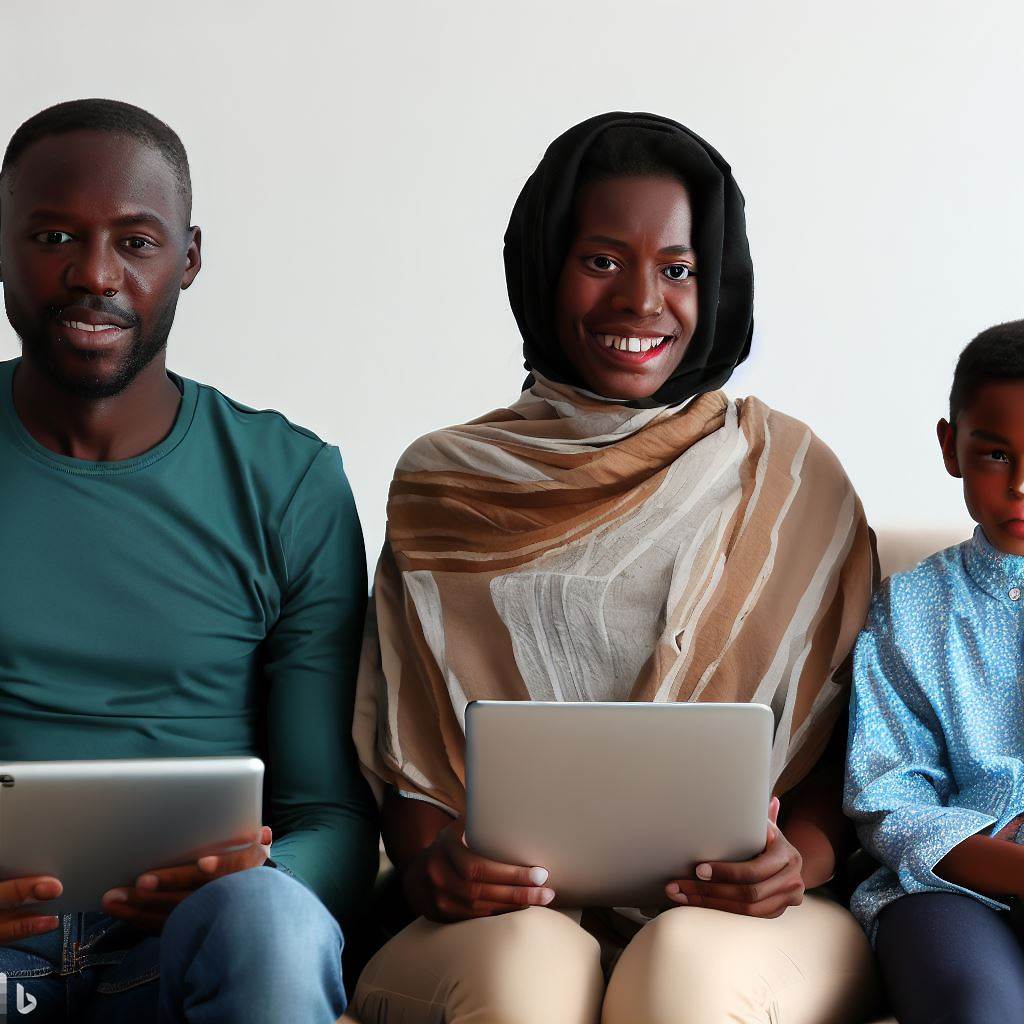Introduction
The intertwining of religion and family life is deeply rooted in Nigerian culture, influencing various aspects of society, including family therapy. This blog post delves into the intricate relationship between religion and family therapy in Nigeria, highlighting the significance of understanding this influence for more effective therapeutic outcomes.
Importance of Understanding Religious Influence on Family Therapy
Religion holds immense sway over the lives of many Nigerians, shaping their beliefs, values, and behaviors. When it comes to family therapy, this influence cannot be ignored.
Therapists need to comprehend how religious beliefs impact family dynamics, communication patterns, and conflict resolution strategies.
By recognizing these connections, therapists can tailor their approaches to better resonate with their clients’ religious convictions and cultural norms, fostering a more trusting and productive therapeutic relationship.
Purpose of the Blog Post
This blog post aims to shed light on the intersection of religion and family therapy in Nigeria. By exploring case studies, research findings, and expert insights, we will unravel how religious beliefs affect family therapy processes and outcomes.
As religion continues to play a pivotal role in Nigerian families’ lives, it’s imperative for therapists to navigate this influence sensitively and effectively.
Through this exploration, we hope to equip both therapists and individuals seeking therapy with a deeper understanding of how religion can impact family dynamics and how therapists can integrate cultural and religious sensitivity into their practices.
Overview of Family Therapy: Navigating Nigeria’s Cultural and Religious Influences
Defining Family Therapy and Its Goals
Family therapy, a dynamic approach to healing, centers on resolving conflicts and enhancing communication within families.
Its core goals encompass fostering understanding, promoting harmony, and nurturing individual growth.
Embracing Cultural Context in Family Therapy
Recognizing that cultural context molds familial dynamics is pivotal. Family therapists must comprehend cultural norms, roles, and communication styles to tailor interventions effectively.
- Cultural Sensitivity: Family therapists must navigate diverse cultural backgrounds sensitively to ensure therapeutic effectiveness.
- Communication Styles: Understanding culturally influenced communication patterns aids in breaking down barriers and fostering open dialogue.
Unpacking Nigeria’s Unique Cultural and Religious Aspects
Nigeria’s rich tapestry of cultures and religions intricately shapes family structures and interactions, significantly impacting therapeutic approaches.
- Religious Diversity: Nigeria’s religious spectrum, including Christianity, Islam, and traditional beliefs, affects familial values and expectations.
- Role of Spirituality: Integrating spirituality into therapy can provide solace and guidance, but it demands a delicate balance respecting diverse beliefs.
- Collectivism: Nigeria’s collectivist culture emphasizes communal ties, influencing decision-making and conflict resolution within families.
- Gender Roles: Traditional gender roles persist, influencing power dynamics. Family therapists must address these sensitively.
- Extended Families: Nigeria’s strong emphasis on extended families requires therapists to navigate complex relationships beyond nuclear units.
Essentially, effective family therapy in Nigeria hinges on grasping the cultural intricacies interwoven with religious beliefs.
Therapists must approach each case with cultural humility, promoting dialogue that respects diverse viewpoints and traditions.
This ensures that the healing process aligns harmoniously with the values cherished by Nigerian families.
Role of Religion in Nigerian Culture
Significance of religion in Nigerian society
Religion plays a vital role in the lives of Nigerians, shaping their culture, beliefs, and values.
It permeates every aspect of their existence, providing a framework for social, political, and economic activities.
Major religions practiced in Nigeria (Christianity, Islam, traditional religions)
- Christianity: Introduced by missionaries during colonial times, Christianity is the most widespread religion in Nigeria.
It has diversified into various denominations, including Catholic, Protestant, and Pentecostal churches. - Islam: Brought by traders from the north, Islam has a significant following in Nigeria, particularly among the Hausa-Fulani and Kanuri ethnic groups.
Muslims constitute a sizable portion of the country’s population. - Traditional religions: Before the arrival of foreign religions, Nigeria had a rich tapestry of indigenous beliefs and ancestral worship systems. These traditional religions vary across regions and ethnic groups.
Influence of religion on various aspects of Nigerian life, including family dynamics
- Moral guidance: Religion provides a moral compass for Nigerians, shaping their behavior, ethics, and decision-making. It instills values such as honesty, compassion, and respect for elders.
- Family cohesion: Religion plays a crucial role in fostering strong family bonds. It emphasizes the importance of marriage, nurturing healthy relationships, and raising children with strong moral foundations.
- Gender roles: Nigerian religions often reinforce traditional gender roles within families. Christianity promotes the idea of male leadership, while Islam places an emphasis on the submission of women to their husbands.
- Rituals and ceremonies: Religious rituals and ceremonies mark significant milestones in Nigerian family life, such as births, marriages, and deaths. These events are often celebrated and attended by the entire community.
- Conflict resolution: Religion offers guidance and frameworks for resolving conflicts within families. Many Nigerians turn to their religious leaders or scriptures to seek advice and find reconciliation in times of disagreement.
- Support networks: Churches and mosques provide social support networks for Nigerian families. They offer counseling services, financial aid, and community programs that contribute to the overall well-being of families.
- Education and socialization: Religious institutions play a vital role in education and socialization. They provide religious teachings, moral education, and guidance for young Nigerians, reinforcing traditional values and cultural practices.
- Influence on decision-making: Religion influences decision-making within Nigerian families, guiding choices related to marriage partners, career paths, and even political affiliations.
- Community involvement: Religion fosters community involvement and social responsibility among Nigerians. Religious groups often engage in charity work, community development projects, and advocacy for social justice.
Basically, religion holds great significance in Nigerian society, permeating every aspect of life, including family dynamics.
Christianity, Islam, and traditional religions shape beliefs, values, and behaviors, fostering strong family bonds and guiding decision-making processes.
The influence of religion extends beyond the individual, contributing to community development and promoting social cohesion.
Read: Salary Expectations for Marriage & Family Therapists in Nigeria
The Intersection of Religion and Family Therapy in Nigeria
How Religion Shapes Understanding of Mental Health and Family Issues
Religion in Nigeria significantly influences the perception and comprehension of mental health and family-related problems.
Believers often view mental health challenges as spiritual afflictions caused by demonic forces or divine punishments.
The belief in supernatural influences on mental health affects help-seeking behaviors, treatment preferences, and stigma surrounding mental illness.
Religion molds the understanding of family issues, with emphasis placed on maintaining traditional family values and hierarchical structures.
Role of Religious Leaders in Providing Guidance and Counseling
Religious leaders play a pivotal role in offering guidance and counseling services to families in Nigeria
These leaders possess spiritual authority and are revered as trustworthy sources of advice and consolation.
Families often turn to religious leaders for solutions to conflicts, marital problems, and parenting challenges.
Religious leaders provide emotional support, mediate disputes, and offer spiritual guidance to promote family harmony.
Impact of Religious Practices, Beliefs, and Principles on Family Therapy
Religious practices, beliefs, and principles heavily influence the approach and methods used in Nigerian family therapy.
Therapists, aware of the significance of religion, integrate religious rituals, prayers, and scriptures into therapy sessions.
Religious teachings guide therapy principles, emphasizing forgiveness, repentance, and reconciliation as essential elements in family healing.
Religion also affects the choice of interventions, as therapists may incorporate spiritual exercises such as fasting, meditation, and worship.
However, the influence of religion on family therapy can sometimes hinder effective treatment if religious dogma contradicts evidence-based psychological approaches.
By understanding the intersection of religion and family therapy in Nigeria, one can appreciate the unique challenges and strengths associated with this context.
Religion shapes the perception of mental health and family issues, influencing help-seeking behaviors and treatment preferences.
Religious leaders serve as important counselors and mediators within families, providing guidance and support.
Additionally, religious practices, beliefs, and principles contribute to the methods and interventions used in family therapy.
While religion can be a valuable resource for healing, therapists must navigate the potential conflicts between religious beliefs and evidence-based therapeutic approaches.
Read: Challenges & Rewards of Being a Family Therapist in Nigeria

Challenges and Benefits of Incorporating Religion in Family Therapy
Challenges Faced by Family Therapists in Integrating Religion into Therapy Sessions
- Limited knowledge or understanding of specific religious beliefs and practices.
- Maintaining a neutral stance while addressing religious matters to avoid potential biases.
- Navigating potential conflicts between the therapist’s own beliefs and those of the clients.
- Developing appropriate strategies to address religious and cultural diversity within therapy.
- Ensuring that incorporating religion does not undermine the therapeutic goals and techniques.
- Handling resistance or skepticism from clients who may not be religious or who have different beliefs.
- Balancing the framework of evidence-based therapies with religious considerations.
- Adapting therapy techniques to accommodate religious rituals or practices that may conflict with usual therapeutic approaches.
- Ensuring that religious beliefs do not restrict the autonomy or agency of clients.
- Addressing potential ethical dilemmas related to confidentiality and religious disclosures.
Potential Benefits of Incorporating Religious Beliefs and Practices in Therapy
- Enhanced client engagement and willingness to participate in therapy when religion is incorporated.
- Religious beliefs can provide a sense of comfort and support during times of crisis or distress.
- Integration of religion may facilitate the exploration of existential and Meaning of Life issues.
- Religious frameworks can provide clients with a comprehensive system of values, morals, and ethical guidelines.
- Religion can offer clients a source of hope, resilience, and coping mechanisms in challenging circumstances.
- Incorporating religious beliefs can foster a sense of cultural relevance and sensitivity in therapy.
- Addressing religious dimensions may contribute to a more holistic and comprehensive understanding of clients.
- Religious rituals and practices can serve as therapeutic tools, promoting relaxation and emotional regulation.
- The inclusion of religious perspectives can promote social support and integration within religious communities.
- Religion can provide a source of identity, purpose, and meaning for individuals and families undergoing therapy.
The Importance of Cultural Competency for Therapists Working Within Religious Contexts
Cultural competency refers to the ability of therapists to understand and respect the beliefs, values, practices, and cultural contexts of their clients.
When working with religious clients, cultural competency becomes fundamental in providing effective and ethical therapy.
Some key aspects of cultural competency within religious contexts include:
- Developing knowledge about different religious traditions, their customs, and rituals.
- Acknowledging and challenging personal biases and assumptions related to religion.
- Respecting clients’ religious beliefs and practices, even if they differ from the therapist’s own.
- Creating a safe and inclusive therapeutic environment where religious diversity is valued.
- Collaborating with religious leaders or authorities, when appropriate, to ensure comprehensive care.
- Addressing the intersectionality of religion with other cultural factors, such as race, gender, and social class.
- Recognizing the potential impact of religious trauma and providing appropriate support.
- Continuously updating knowledge and skills to adapt to new religious developments or research.
- Ensuring ethical guidelines are followed when addressing religious disclosures or conflicts.
- Working within the boundaries of one’s competence, consulting with colleagues or supervisors when needed.
Incorporating religion in family therapy in Nigeria presents unique challenges and opportunities.
By understanding and addressing these challenges, therapists can harness the potential benefits and create culturally sensitive and effective therapy experiences for their clients.
Read: Continuing Education for Family Therapists in Nigeria
Examples of Religion’s Influence on Family Therapy in Nigeria
Present case studies or real-life examples showcasing the influence of religion on therapy outcomes
Religion plays a significant role in family therapy in Nigeria, with many cultural and traditional practices intertwined with religious beliefs.
Several case studies illustrate how religion’s influence affects therapy outcomes positively.
For instance, in a case where a couple faced infertility issues, their faith in God provided them with comfort and strength to cope with the emotional distress.
The therapist integrated religious rituals into the therapy sessions, such as prayer and reciting religious texts.
This integration of religion helped the couple find solace and ultimately contributed to their resilience and acceptance of their situation.
Another real-life example involves a family grappling with addiction in Nigeria.
The therapist acknowledged and respected the family’s religious beliefs, recognizing that they sought strength from their faith to overcome their struggle.
By incorporating religious practices, such as attending support groups held in religious institutions and integrating prayers into therapy sessions, the therapist created an environment that aligned with the family’s religious values.
As a result, the family felt supported, motivated, and empowered to work towards recovery.
How therapists adapt their approaches to respect religious beliefs and values
In Nigeria, therapists often adapt their therapeutic approaches to respect the religious beliefs and values of their clients.
They understand that religion holds a significant place within the fabric of Nigerian society and can greatly impact individuals and families.
Therapists recognize the importance of creating a safe space where clients can openly express their religious beliefs without fear of judgment or dismissal.
To respect religious beliefs, therapists incorporate elements of spirituality and religious practices into therapy sessions when appropriate.
This may involve incorporating prayer, meditation, or religious scriptures relevant to the clients’ faith.
By doing so, therapists create a sense of familiarity and reinforcement of the clients’ values, reinforcing their faith as a source of strength and guidance.
Positive outcomes and success stories resulting from the integration of religion and therapy
Numerous success stories showcase the positive outcomes resulting from the integration of religion and therapy in Nigeria.
One such story involves a family struggling with communication and conflict resolution.
By incorporating religious teachings, such as forgiveness and compassion, the therapist helped the family to understand and apply these principles in their daily interactions.
As a result, the family experienced improved communication and a strengthened bond, leading to a more harmonious and peaceful family dynamic.
In another success story, religion’s influence on therapy outcomes was evident in the case of a couple experiencing marital challenges.
The therapist encouraged the couple to incorporate spiritual practices, such as joint prayer and attending religious counseling, into their therapeutic journey.
This integration of religion enhanced the couple’s commitment to working on their relationship, leading to improved understanding, empathy, and ultimately, marital satisfaction.
Religion’s influence on family therapy outcomes in Nigeria is undeniable.
Through case studies, we see how religion can provide comfort, strength, and motivation to individuals and families facing various challenges.
Therapists adapt their approaches to respect the religious beliefs and values of their clients, creating a safe and supportive environment.
The successful integration of religion and therapy results in positive outcomes, including improved communication, strengthened relationships, and increased resilience.
Ultimately, religion plays a vital role in shaping family therapy in Nigeria and promoting holistic healing.
Read: Role of Culture in Nigerian Marriage & Family Therapy
Ethical Considerations and Limitations
Potential ethical dilemmas that may arise when working with religious clients
- Confidentiality: Balancing the need to respect client privacy while addressing religious elements in therapy.
- Imposing Beliefs: Being cautious to not impose the therapist’s religious beliefs on clients.
- Boundary Maintenance: Ensuring appropriate boundaries and avoiding dual relationships with clients.
- Informed Consent: Clearly explaining the impact of religious beliefs on therapy and obtaining consent.
- Professional Competence: Seeking supervision or training when addressing specific religious issues in therapy.
Importance of maintaining client autonomy and respecting diverse beliefs
Respecting client autonomy in religious family therapy grants them the freedom to make independent decisions about their beliefs and values.
It allows individuals and families to explore their own spiritual paths while receiving professional guidance.
Respecting diverse beliefs empowers clients to express their religious or cultural practices without feeling judged or rejected.
It cultivates an inclusive therapeutic space where different belief systems can coexist harmoniously.
By maintaining client autonomy and respecting diverse beliefs, therapists create a foundation of trust and collaboration, fostering a therapeutic environment that promotes growth and positive change.
Read: Occupational Therapy Schools: Where to Study in Nigeria
Limitations of relying solely on religion for therapeutic interventions
- Interpretation Differences: Religious texts or teachings can be interpreted differently, leading to conflicting therapeutic advice.
- Exclusivity: Reliance solely on religion may exclude clients with non-religious or alternative spiritual beliefs.
- Secular Legal Frameworks: Adhering strictly to religious principles may conflict with secular legal and ethical standards.
- Psychological Complexity: Religion may not fully address psychological and emotional issues that require specialized interventions.
- Religious Trauma: Strict adherence to religious beliefs can perpetuate or exacerbate religious trauma in some individuals.
It is crucial for therapists to recognize these limitations and integrate other therapeutic modalities, such as evidence-based practices, when necessary.
In general, while religion plays an influential role in family therapy in Nigeria, therapists must be mindful of potential ethical dilemmas, maintain client autonomy, and acknowledge the limitations of relying solely on religion for therapeutic interventions.
By navigating these considerations thoughtfully and respectfully, therapists can provide effective and culturally sensitive support to religious clients and their families.
Conclusion
In this post, we examined the influence of religion on family therapy in Nigeria.
It is crucial to understand this influence as it shapes the beliefs and practices in therapy.
In Nigeria, the influence of religion on family therapy is undeniable, shaping beliefs, values, and behaviors. Recognizing and respecting this influence is vital for therapists to provide effective and culturally sensitive interventions.
By acknowledging the role of religion in family dynamics, therapists can bridge gaps, promote understanding, and foster stronger therapeutic relationships.
The integration of religious beliefs into therapy can lead to more meaningful outcomes, enhanced communication, and improved conflict resolution within families.
Publish Your Professional Profile, Business or Brand
Showcase your expertise, gain trust, and boost visibility instantly on Professions.ng.
Publish NowAs Nigeria continues to be a diverse and religiously inclined society, therapists must embrace this aspect of clients’ lives, tailoring their approaches accordingly.
By embracing the unique interplay between religion and family therapy, practitioners can contribute to more comprehensive and holistic healing, enhancing the well-being of Nigerian families.
Further research and exploration in this area will help enhance the effectiveness of family therapy in Nigeria.




